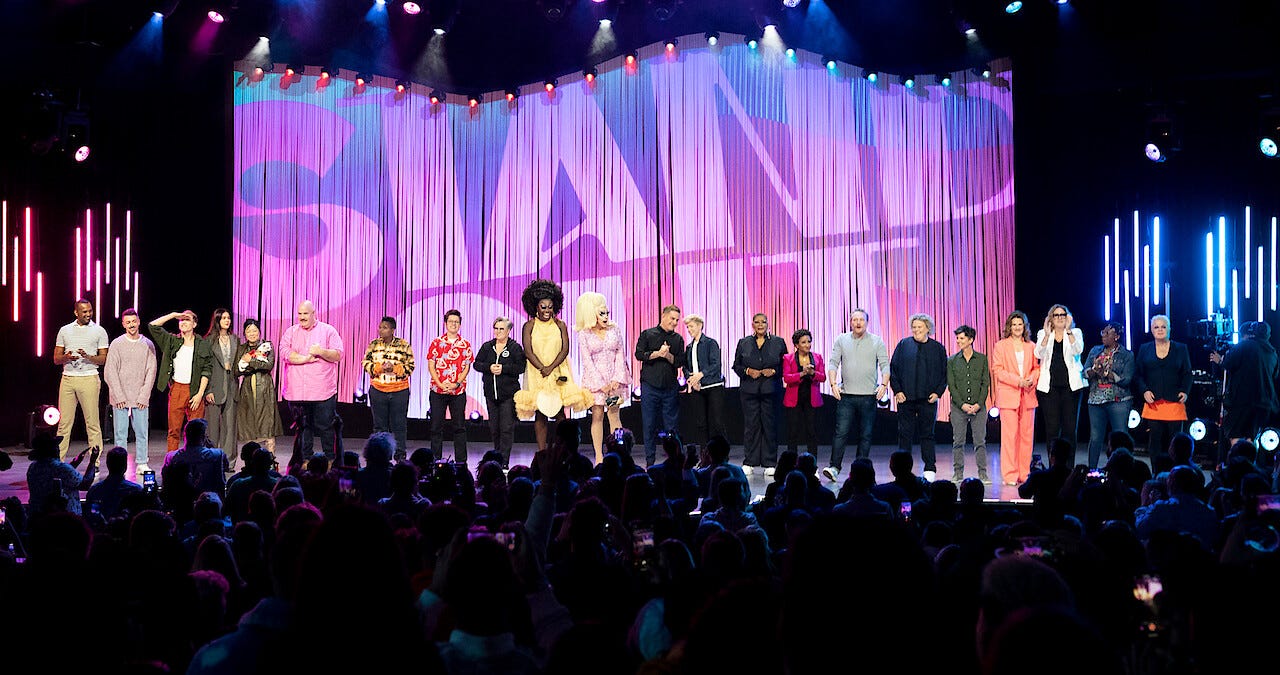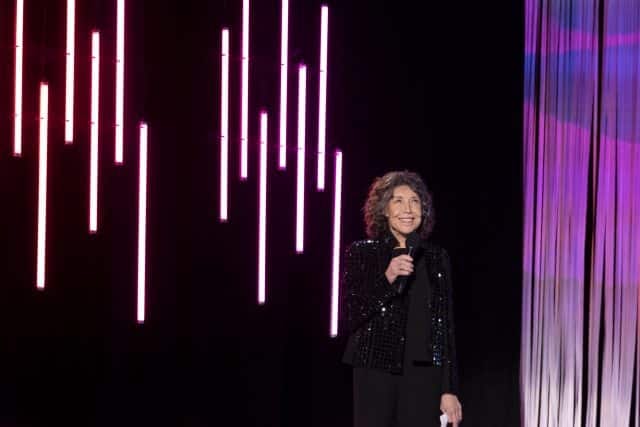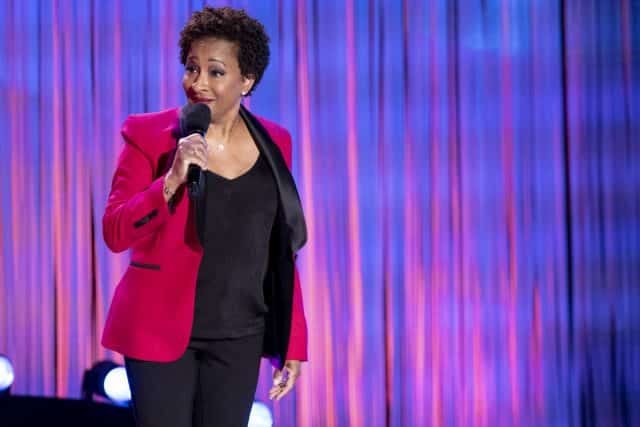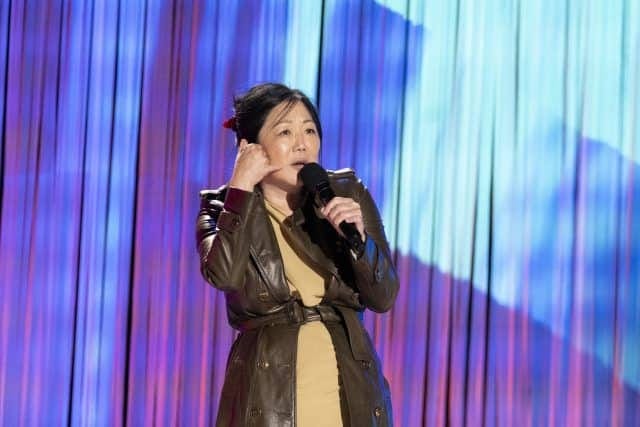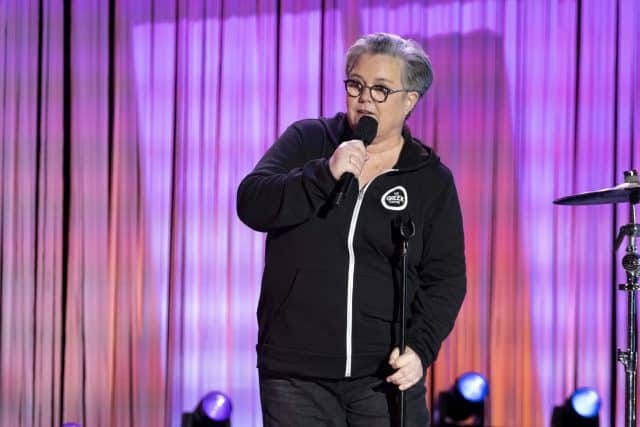Outstanding: A Comedy Revolution (2024)
Gutsy LGBTQ+ comedians crack jokes, share heartaches and demolish closet walls
22 undaunted comedians bring spicy humor and fierce pride to L.A.’s Greek Theater
Outstanding: A Comedy Revolution (2024)
Streaming on Netflix
To the punch of Gay Pride Month this movie adds punchlines: barbed, over-the-top, moving. When it comes to asserting LGBTQ+ identity, as one of the comedians in this vibrant new documentary explains: We don’t have time for incremental progress. You have to throw down right now.
Which is exactly what happens in Outstanding, a bawdy, joltingly funny exploration of why gay comedy is both uproarious and necessary. On May 7, 2022, at the Greek Theater in Los Angeles, in a show called “Stand Out”, a convocation of 22 gay, Lesbian and trans comedians went on stage to spotlight where gay comedy stands today. And how it got here.
Lily Tomlin
Don’t slide past that catchall part of speech, “trans”, which covers transvestite, transsexual and transgender. You’ll meet all three kinds of comedians here. But don’t overthink those distinctions. Go with the flow. The struggle for equality is the crucial umbrella.
As the laughs bubble up, listen carefully, too, for “transgressive” and “transformation”. Those two fighting words are also tightly woven into the rainbow banner.
Under Page Hurwitz’ smooth direction, the documentary intersperses selections from (1) the gay comics’ onstage performances on the big night, (2) archival footage from their past nightclub, stage and TV appearances and (3) candid interviews where they talk straight to the camera.
We learn how being funny for a crowd took some of the sting out of being put down for who they were. Every comic had to delicately finesse their coming out, first to those close to them, then, in a subsequent leap, on stage.
Wanda Sykes
Some performers we see are well known, with carefully managed career trajectories. Lily Tomlin, for instance, consciously postponed coming out, letting her keen performing instincts tickle audiences when they didn’t yet know her full story. The public would learn about her sexual orientation all in good time.
By being indirect Tomlin found her direction, drawing on her past to hone her individualized style. As she says of her formative teenage years, “No one was gay back then, only shy.”
Which meant that later, in TV skits, she stepped around questions of personal identity and created characters, like Ernestine the telephone operator, that solidified her appeal.
She “never held a press conference” to announce she was gay. She also never hid the fact, but before coming out her celebrity was already a bulwark and a calling card.
Sandra Bernhard, by contrast, came on strong from the start as Lesbian in nightclub and stage appearances.
Audiences were going to have to take Bernhard as they found her, and by frontally attacking prejudice, notably in her groundbreaking show Without You I’m Nothing, she built a career and encouraged other gay comics to hold nothing back.
By the time Bernhard had made her mark on national TV with repeated appearances on Letterman, she was seen one night on that show giddily, fearlessly flirting with Madonna (who gleefully reciprocated).
Bernhard’s manifesto was simple: when it came to sexual identity, it was long past time for society to move toward acceptance. “Enough already. Things have got to change. Things have got to evolve. Let’s just get on with it,” she insisted.
Wanda Sykes fell between these two approaches, the gradual and the non-negotiable. Showbiz insiders knew she was gay, but her public coming out happened at a single event. Her comedy had been topical, especially on race, but on stage she’d steered clear of sexual orientation.
Then after being introduced as an “ally” of the gay community at a 2008 rally for gay rights, without knowing why, she announced that she was married to a woman.
Afterwards, when friends told her what she’d just done, still a little baffled, she said, “I’m really out, huh?” Since then, while often speaking proudly about her wife, her career in clubs and on TV has soared.
Margaret Cho
Perhaps the brashest seasoned queer – the descriptor she prefers – performer on the current scene is Margaret Cho, who says Bernhard was the comedian she most looked up to.
Born to immigrant Korean parents in multicultural San Francisco, Cho, who soaked up life in that city’s richly varied communities, may still be the most cheerfully blatant nationally known queer comedian today.
And the most sexually blunt. “I don’t care who you are, I want you to want me,” she dares her audiences on stage. When she announces that basically she’s “slutty”, she isn’t promoting promiscuity. She’s advocating for openness on behalf of everyone, gay, straight or anywhere on the sexual spectrum.
Her omnisexuality scared network producers of her ABC sitcom “All-American Girl”, which ran only seven months, from September 1994 to March 1995, before being canceled. Did Cho fail to find an audience or, as we hear Diane Sawyer, an ABC newscaster, wonder: “Did this network pretty much abandon her?”
A wised-up Cho moved on, and says the experience sent her back to working standup with more backbone. Her act, she insists, got more authentic when she was free to put her own sexual priorities front and center, without censorship or outside control. The “setback” made her stronger.
Rosie O’Donnell
Each performer comes out, and makes comedy, uniquely. Rosie O’Donnell and Ellen DeGeneres were widely known TV personalities with no intention of coming out to their millions of fans.
They were also friends, and we see a hilarious moment on O’Donnell’s talk show where she and Ellen, a guest, cheekily agree they both could well be “Lebanese”.
That wink-wink was strategic, veering toward but stopping short of coming out, and it kept them both in the game. When O’Donnell’s talk show producers signed her, she told them she was Lesbian, and they should be prepared for a public backlash.
It didn’t happen until she outed herself in 2002 at Caroline’s Comedy Club in New York, but by then her show had made her famous. Ellen had come out in 1997 to widespread praise on her own show, and she says it was a sudden decision that, once made, felt natural, almost inevitable.
Lesser-known performers had it tougher and their coming out happened in carefully weighed, sometimes gnawingly cautious, stages. The documentary captures some priceless moments of courage and soul-stirring humor.
Robin Tyler at 16 told her mother she was gay and from that moment was never in the closet. She laughingly recalls from her early performing years a man standing up during her show and nastily shouting, “Hey, I don’t like what you’re saying. Hey, are you a Lesbian?” Her comeback: “Hey, are you the alternative?”
Todd Glass tearfully recounts the shattering moment when he lay in a hospital bed recovering from a heart attack and his boyfriend brought him a flower. Because they were both closeted, his boyfriend quickly hid the flower under Glass’s pillow. Glass, deeply shaken, decided that sort of hiding had to end, and he came out soon afterward.
By the end we understand that there was pain behind the laughter these dedicated entertainers brought out of us. “Gender journeys”, one of them calls their struggles.
It hasn’t been easy for anyone in America to be gay, and it’s posed a unique challenge for these chosen few to be funny about it. For them, judging by this documentary, irksome questions persist: Who are you making comedy for? Other LGBTQ+ people, or the world at large?
By the end of this delightful, affecting tribute, it’s clear they do it not just for themselves but for everyone, gay, straight or otherwise. Maybe to be human means being a gender explorer and we’re all traveling along the same still-being-mapped roadway.




